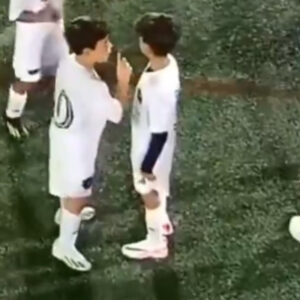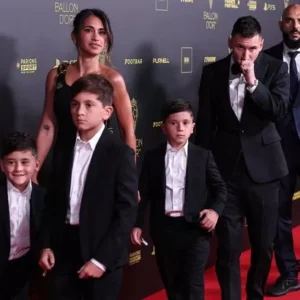Model communication skills for children
Your child learns a lot about conversation from talking and listening to you . So you can help your child develop their conversation skills by talking to them whenever possible.
Your child also learns by watching your conversations with others . So you can help your child develop good conversation skills by talking to your partner, other adults and children the way you want your child to talk to others. For example:

Smile, make eye contact, and use friendly greetings. For example, say ‘Good morning’ to family, ‘Welcome’ to guests and ‘How are you?’ to people in the community. Talk to your partner in positive ways and handle conflict constructively . Use body language and tone of voice to show interest and attention when you talk to others. If someone wants to talk to you and you’re on the phone, put the phone down or let them know you’ll stay with them now. This way, you can give the other person your full attention.
Practice, remind, and guide children’s conversation skills
Learning how to talk and listen to others takes time and practice. Some children learn this quickly and others may need your support.
Practice conversations with your child in which you take turns asking questions and listening to the answers. Practice what your child might say when attending a social event. For example: ‘Hello Nola. Do you want to play on the swings with me?’ Suggest or brainstorm things your child might say when meeting new people. For example: ‘Hello. My name is Veronica. My house has a dog. Do you have pets?’
Remind your child. For example: ‘Say thank you to grandma for taking you to the park’. Use clear and gentle reminders when you need them. For example: ‘Rani, please look at me when you talk to me’. Suggest ways your child can start conversations about other people’s interests. For example: ‘Uncle Zak just bought a new car. He would like it if you asked him about his car today.’
instruct

Set family rules about respectful communication and conversation. Discuss these with your children so they understand what is expected. Guide your child. For example: ‘Sarah, if I’m talking to someone, you need to say “Excuse me”, then wait until I’m ready to listen’. Praise children when they communicate well. This will make them want to keep doing it. For example: ‘I like how you waited for me to finish talking before you started talking’. Or ‘You did a great job doing what I please and just thank you’. Apply sanctions if your child talks back or speaks rudely.
Children learn best through play, so pretend play can be a fun way to help them develop and practice their conversation skills. For example: ‘Let’s pretend you’re the mom on the phone and I’m the kid. What should I do if I want to talk to you?’ Or you and your child can use toys or puppets to pretend to talk about funny, interesting, or even silly things.
Managing disruptions

Interruptions often occur when children cannot control their desire to talk. But unless it’s an emergency, it’s important to help your child learn to wait. Letting others finish what they say or do is part of positive and respectful communication and helps children get along with others.
How you manage interruptions will depend on your child’s age and developmental stage . For example, younger children and children with additional needs may have difficulty understanding that they should say ‘Sorry’ and wait for you to respond. Preschoolers may only be able to respond to a quick ‘Just a minute’ before you pay attention to them. School-aged children may wait longer.
The following general tips for managing interruptions will help most children:
Let your child know when it’s okay to interrupt immediately. For example, if something dangerous or urgent is happening, they should be allowed to intervene. Teach your child to put their hand on your arm if they need to say something while you are speaking. You can then place your other hand on top of theirs to let them know you understand.
As your child gets older and you know they can wait, you can try these ideas for managing interruptions:
Remind your child of your family’s rules about interrupting. Then continue the conversation until your child says ‘Excuse me’ or puts their hand on your arm. When your child says ‘Sorry’, try to quickly reward him or her with your attention. Your child will see that if they do the right thing they will get what they want. Praise your child when they say ‘Sorry’ and wait for you to pay attention to them. This encourages your child to continue speaking this way. For example: ‘You waited until I finished the call before asking for help with your doll. Well done!’ If you have an important call or activity that can’t be interrupted, try distracting your child with a special toy or a fun activity or letting them know how long you’ll be there. Deal with talking back or back-talk

Your child may argue when you set limits, give instructions, or give punishments. For example, they may use a rude tone, argue, or try to negotiate when it’s not appropriate.
If this happens, the first thing you should do is calmly respond and remind your child of family rules about speaking respectfully and treating each other with respect.
And if your child continues to be rude, provide a punishment for that rudeness. This could be anything from practicing different speech patterns to losing a privilege like screen time.
Things that affect children’s communication skills
There are things that can affect how children develop conversation skills:
Self-regulation – this includes the ability to manage your behavior and reactions to things happening around you. It is an important part of learning to speak and listen. Children develop the ability to self-regulate as they grow older. Temperament – for example, a highly social child may want to participate in every conversation and have difficulty listening. On the other hand, a child who is shy or slow to socialize may find it easier to listen but harder to respond. Autism and other additional needs – for example, children with autism have a range of communication skills but may need support to learn and practice their skills. Children with deafness and hearing loss may need specialist support.



